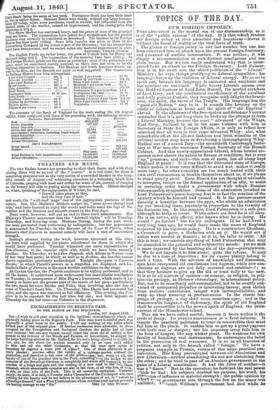THEATRES AND MUSIC.
The two Italian houses are preparing to shut their doors: and with their closing there will be an end of the "season." It is full time; for there is something preposterous in the very notion of a crowded theatre in the beau- tiful month of August—of subjecting ourselves to a voluntary black hole of Caloutta, gasping with heat and stifled for want of air, instead of ranging on the breezy hill-side or pacing along the open sea-beach. Milton thought so, when, speaking of the enjoyments of Winter, he said,
" Tower'd cities please us then, And the busy hum of men;" and made the "well-trod atage" one of the appropriate pastimes of that season. But, like Moliere's Itiddeein malgre lui, "noise avons change tout cola," and have learned to enjoy the woods and fields amid the fogs of No- vember and the theatres and concert-rooms in the Dog-days.
Next week, however, will put an end to these town amusements. Her Majesty's Theatre announces that the "farewell nights" will be Tuesday, Thursday, and Saturday next. Madame Sontag, during the past week, has been prevented from performing by indisposition; but her appearance is announced for Tuesday, in the Susanna of Le Nozze di Figaro, when Mozart's chef d'ceuvre in musical comedy will have a cast of uncommon strength.
Sontag's absence during the week, however untoward at this time, his been well supplied by the pieces substituted for those in which she would have performed. Tuesday witnessed one more representation of Don Giovanni, in the superior style with which we have been recently familiar. On Thursday, we had Don Pasquale, with Alboni in Marina —one of her very best parts; in which, as well as in Zerlina, she has this season shown capacities previously undeveloped. Tonight the opera is Luerezia Borgia; in which Pamirs powers as a tragedian are displayed, and La- blache's .Duke of Ferrara is the mast terrible exhibition on the stage.
At Covent Garden, the Prophae continues to be nightly performed, and to fill the house. It underwent some unfortunate but unavoidable mutilations on Tuesday, in consequence of Miss Hayes's hoarseness, which made it ne- cessary to leave out the greater part of the music of her part—particularly the two duets between Bertha and Fides, thus involving also the loss of some of Viardot's finest bits. On Thursday, Miss Hayes had recovered her voice, and the opera was restored to full efficiency. This evening, the Pro- pUte is to be repeated for the last time but one; and Grrisi appears on Thursday for the last time—as Valentine in the Huguenots.


























 Previous page
Previous page